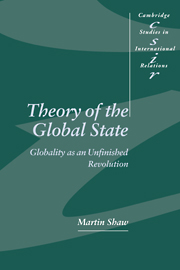Book contents
- Frontmatter
- Contents
- Preface
- 1 Introduction: globality in historical perspective
- Part I Critique
- Part II History and agency
- Part III State
- 6 State in globality
- 7 Relations and forms of global state power
- 8 Contradictions of state power: towards the global state?
- Part IV Conclusion
- References
- Index
- CAMBRIDGE STUDIES IN INTERNATIONAL RELATIONS
8 - Contradictions of state power: towards the global state?
Published online by Cambridge University Press: 07 October 2009
- Frontmatter
- Contents
- Preface
- 1 Introduction: globality in historical perspective
- Part I Critique
- Part II History and agency
- Part III State
- 6 State in globality
- 7 Relations and forms of global state power
- 8 Contradictions of state power: towards the global state?
- Part IV Conclusion
- References
- Index
- CAMBRIDGE STUDIES IN INTERNATIONAL RELATIONS
Summary
The global revolution poses fundamental problems for states of all kinds. Even the most democratic state involves the separation of power from society, and apparatuses with inherited modes of insulating themselves from accountability. Even the most internationalized state is still a particular concentration of power, and comes with the historic baggage of nationality and (usually) empire. The expansion of democracy, individual rights and an autonomous realm of civil society challenge the established modes of power in all state centres. The common, global character of the transformation challenges all states' assumptions about the particularity of their dominions.
The global revolution is rooted in society rather than in states, but its core process is a transformation of state relations – the social relations surrounding state institutions – and it necessarily involves major changes in state forms. State elites are not the primary social forces transforming these relations, but they are active participants in the processes. Given the physical, authoritative and infrastructural resources of states, the responses of their elites to movements for change are crucial. States are paradoxically both obstacles to global transformation and central means through which change comes about.
The roles of quasi-imperial nation-states, new and proto-states, the Western state and the global layer in these changes are all subject to fundamental contradictions, but of radically different kinds. Nation-states are the centres of state power least transformed in the global revolution so far, and their relatively imperial and authoritarian power structures are most challenged by its further advance.
- Type
- Chapter
- Information
- Theory of the Global StateGlobality as an Unfinished Revolution, pp. 232 - 256Publisher: Cambridge University PressPrint publication year: 2000



